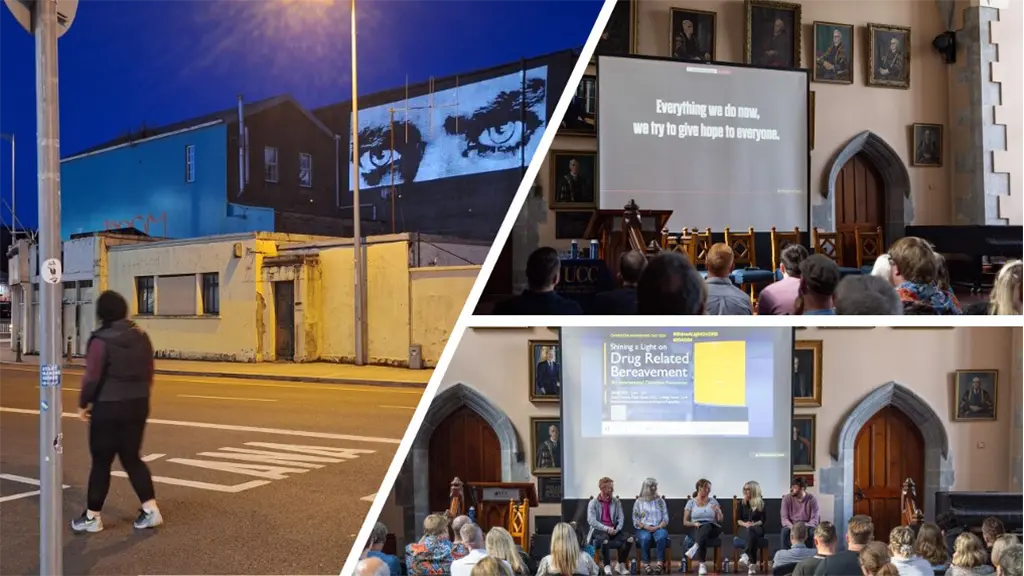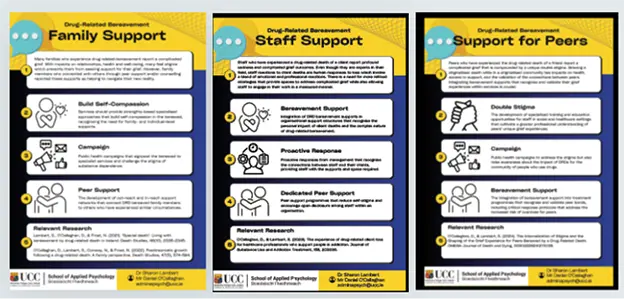In This Section

The Challenge
The European Drug Report 2024 reported Ireland had among the highest rates of drug-related deaths (DRDs) in the EU. More than four times the average number of fatalities, the recent Irish Citizen’s Assembly on Drug Use reported “alarming levels” of DRDs nationally.
Despite the prevalence of DRDs across the globe, few research efforts addressed the widespread bereavement that remained hidden behind each statistic. A significant public health concern that intersects with SDGs #3 “Good Health and Wellbeing” and #10 “Reduced Inequalities,” those bereaved by DRDs experience unique and profound health inequities. The bereaved are often forced to grieve in silence, trapped in cycles of shame, isolation, and self-blame with reduced access to support. Such disenfranchised grief places the bereaved at increased risk for harmful short- and long-term health outcomes, including non-communicable diseases and risk of death.
To reduce premature mortality and promote good health and wellbeing, more socially inclusive responses to loss that facilitate early intervention for DRD bereavement are required. Addressing the stigma surrounding drug use can assist in the reduction of inequities in bereavement support, foster community resilience, and promote equitable access to care services.
The Research
In collaboration with the National Family Support Network, Dr Sharon Lambert completed the first Irish study on drug-related bereavement in 2017, exploring impact on families. Co-designed by staff and family members, the technical report was launched by the Minister for Social Protection in the offices of the Irish Human Rights and Equality Commission.
The report highlighted profound gaps in international research and practice, and a strong demand for innovative policy. Daniel O’Callaghan completed a doctoral research project, broadening the scope, co-producing knowledge and research with many community partners, meaningful involvement with those with professional and lived experience.
The research explored additional family-related outcomes, client loss for healthcare professionals, and peer loss. The work has facilitated the assembly of an impacted community to create a visibility around their bereavement as reflected by a mother whose daughter died:
spend many hours blaming myself, seeking to manage better…So to read that what I experience year after year is shared with others too, is encouraging. Thanks so much for doing the work that you do. It is vitally important. The experiences of people affected by drug misuse need to be heard, we are a large and growing group.
The Impact
The Hidden Grief research project has produced several outputs, generating knowledge production through national and international conference presentations, five academic peer-reviewed papers, one technical report, an RTE Brainstorm article, a projected mural and three practice guidelines documents (families, peers, front line workers).
- Lambert, S. and the National Family Support Network (2018). Impact of drug and alcohol related deaths on families. - Drugs and Alcohol. HRB National Drugs Library.
- Lambert, S., O' Callaghan, D. and Frost, N. (2021) ‘Special death’: Living with bereavement by drug-related death in Ireland, Death Studies, Vol 46, No. 10, 2335-2345
- O’Callaghan, D., Lambert, S., Conway, N., & Frost, N. (2022). Full article: Posttraumatic growth following a drug-related death: A family perspective, Death Studies, 47(5), 574–584.
- O'Callaghan, D. & Lambert, S. (2022). The impact of COVID-19 on health care professionals who are exposed to drug-related deaths while supporting clients experiencing addiction - ScienceDirect. Journal of Substance Abuse Treatment, Volume 138,
- Supports needed for Irish families mourning drug-related deaths (RTÉ Brainstorm, 2022)
- O’ Callaghan, D. & Lambert, S. (2024)., The experience of drug-related client loss for healthcare professionals who support people in addiction - ScienceDirect Journal of Substance Use and Addiction Treatment, Volume 158,
- O’Callaghan, D., & Lambert, S. (2024). The Internalization of Stigma and the Shaping of the Grief Experience for Peers Bereaved by a Drug-Related Death - Daniel O’Callaghan, Sharon Lambert, 2024. OMEGA - Journal of Death and Dying.
- I Would Drive Out To The Grave…It Was Like I Was Making His Bed - projected mural (2024). Spicebag.
 An art project exploring the impact of drug-related bereavement was unveiled at an event hosted by Senator Lynn Ruane at UCC in August 2024. Over 170 people involved in policy making, research, service, or those with lived experiences attended.
An art project exploring the impact of drug-related bereavement was unveiled at an event hosted by Senator Lynn Ruane at UCC in August 2024. Over 170 people involved in policy making, research, service, or those with lived experiences attended.
This work has stimulated and informed public debate with the work being covered in a range of media outlets, press, radio and podcasts. The work has also been mentioned in the national parliament at sittings related to drug use in Ireland. The data from the various studies in the hidden grief research project has resulted in the development of three practice guidelines (support for peers, staff support, supporting families). The research continues to ignite interest from relevant stakeholders who are now collaborating the researchers to integrate evidence-informed support frameworks into their organisations such as the delivery of keynotes and policy and training guidance.
More Information
You can contact Sharon.lambert@ucc.ie or daniel.ocallaghan@ucc.ie for information.
“Bereavement for those connected to people who used drugs often results in a complicated grief with significant social and health implications. The stigmas associated with drug use can lead bereaved individuals to struggle with shame, isolation, and a lack of social support while grieving. Those who are bereaved due to drug-related circumstances often experience a complicated tsunami of grief, with their identities and sense of community shattered by the loss.”
- Dr Sharon Lambert, Senior Lecturer, School of Applied Psychology
Banner Image: Launch of art project: I Would Drive Out To The Grave…It Was Like I Was Making His Bed – projected mural (2024). Spicebag. [Images: Max Bell, Photographer, UCC]
College of Arts, Celtic Studies & Social Sciences
Coláiste na nEalaíon, an Léinn Cheiltigh agus na nEolaíochtaí Sóisialta
Contact us
College Office, Room G31 ,Ground Floor, Block B, O'Rahilly Building, UCC
